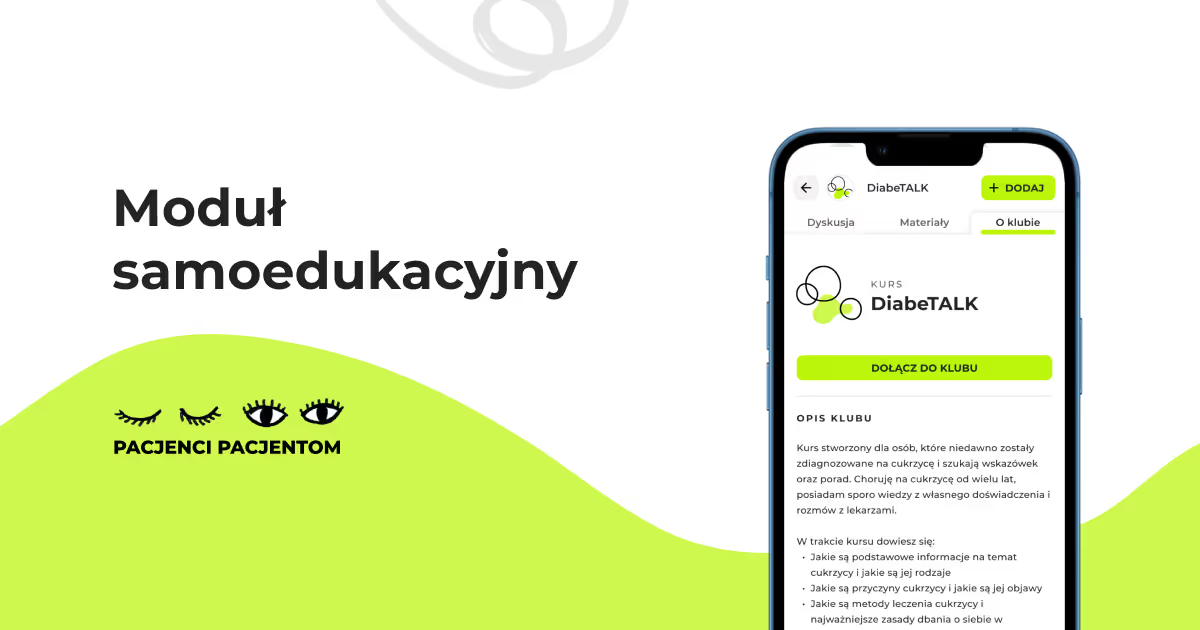Introducing Patients4Patients self-education module: Empowering Patients, Embracing Knowledge!


About
Creating a patient platform for learning and growth - our idea for Patients4Patients app. With participatory design principles, we developed the Self-Education Module, connecting individuals with shared health conditions.
Patients4Patients
Fundacja Ludzie i Medycyna
January 2022- April 2023
Robert Statkiewicz, Luiza Pianka, Filip Purgał, Aneta Wąż, Zuzanna Stańko, Magda Gruszczyk, Magda Bogdanowicz, Iwona Karczewska, Joanna Zembaczyńska, Nataliya Pasichnyk, Katarzyna Błachucka
Slack, Miro, Mural, Figma, Google Meet, Participatory Design methodology and related methods; user research (IDIs, survey, user testing), Design Thinking.
UX, UI, implementation
Case study
Living with a chronic disease or facing a new diagnosis can be an isolating and challenging journey. Patients often encounter social exclusion, misunderstanding, and limited support from their loved ones. In Poland, the healthcare system struggles to provide continuous monitoring and personalized advice to those in need. That's why we took action and created Patients4Patients - a revolutionary patient-support app in 2021.
🤝 Patients4Patients connects individuals living with similar diseases and experiences, fostering meaningful conversations and support within a compassionate community. But that was just the beginning of our mission. We envisioned more - a space where patients could reclaim their agency, learn, and grow by sharing their experiences.
🎓 Introducing the Patients4Patients Self-Education Module!
🎓Our goal is simple yet powerful - to amplify the voice of patients in the public debate and empower them to take charge of their health in an informed and engaged manner.
How can we possibly create a solution that gives patients their voice back without involving them directly? It's simply not possible. That's why we adopted the Participatory Design approach and invited patients to collaborate with us in designing the new app module. Our journey began in November 2022 when we carefully handpicked a group of 14 patients - all potential app users - to join forces with us.
Each of them had a unique background and diseases, and it was them who became the driving force behind creating a patient-friendly tool - the self-education module.
We called this group the Project Group and assigned two foundation members to prepare the design process and facilitate the group on their way to create a patient-friendly tool and implement participatory design principles in the process. We build our process basing it on Double Diamond, to include the phases crucial for Product Development: discovery, define, develop and deliver. For three months the Project Group Members met once a week to work, share conclusions from their individual work and put them together on their way to the perfect solution. Using the Participatory Design approach, the patients:- planned and conducted research on their own, using various methods - analyzed and summarized the knowledge and process it through the Design Thinking Process- determined the direction in which the self-education module would be developed- build 3 prototypes and validate hypotheses associated with each prototype
In the next phase, the Project Group members carried out usability tests, involving other patients in the process. Collectively, they analyzed the test results within the group and used them to decide which solutions to proceed with.
Once the facilitated Project Group's work was completed, we extended an invitation to its members, asking them to join the Foundation and continue contributing to the application's development. Many of them were enthusiastic and accepted the offer with pleasure.In the second part of our work, based on the artifacts created previously, we coined the lo-fi mockups for the Educational Module Solution in Figma. Finally, we ended up with a final solution, meeting the users’ needs. It was the result of 3 iterations, multiple brainstorms and decision-making meetings, and based on the research and design done by Project Group. We introduced a new feature in the application called "Clubs."
With this addition, users can now create communities that go beyond medical topics. For instance, they can establish clubs for German Shepherd dog enthusiasts or movie buffs, among many other possibilities. Moreover, the update allows users to develop and participate in courses, where they can learn from each other and acquire new skills. The "Clubs" tab also enables users to easily add and save links to recommended online resources, keeping everything of interest in one convenient location. In light of the situation in Ukraine, we translated the application into the Ukrainian language so that Ukrainians escaping to Poland could also use it.
Through the project, we:contributed to a significant advancement of the Participatory Design method, especially in the context of dispersed online work;strengthened the patient's voice in creating solutions tailored to this group; provided foundational knowledge and best practices related to UX to patients, which they can and do utilize in other independently conducted projects; learned the organization and facilitation of online workshops for a highly diverse group with varying accessibility needs.
Lessons learned:
We learnt not to ever be too attached to developed solutions and never seize to verify their usefulness among the target group.
How did we learn that? When we developed our first prototypes and started testing them, it turned out that our target group in the end didn’t appreciate certain solutions suggested by the Project Group. This led to a complete transformation of the initial designs of the Project Group.
Why us?
Our project stands out for its innovative approach to empowering patients through participatory design. By involving patients directly in the design process, we ensured that the module meets their specific needs and challenges.



